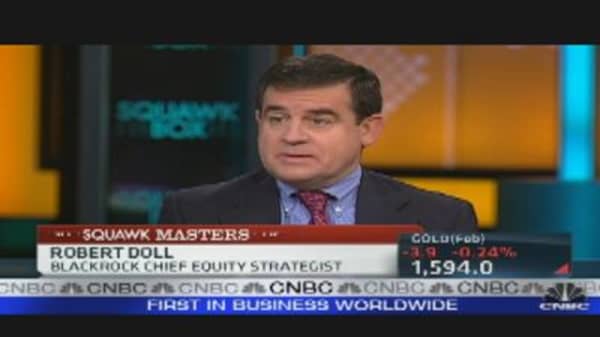Consumer staples companies outperformed the market on news that privately held supermarket operator BI-LOhad agreed to buy Winn-Dixie Stores for $560 million in cash.
Retail firms, though, weakened through the day as some stores reported that Black Friday deals pulled forward demand and hurt subsequent sales. Radio Shack was among the weakest performers.
Volume was anemic, with many traders as well as hedge funds rumored to have closed their books for the year already. Just 500 million shares or so had changed hands on the New York Stock Exchange heading into the final half-hour.
Safety, instead, was the main theme. Investors flocked to bonds, sending the yield on the benchmark 10-year note down to 1.80, its lowest since September.
Around this time of year the market begins looking for a late-quarter rally.
Traders will be watching the charts of the Dow industrials and S&P 500, both of which had been nearing what is known as a "Golden Cross," where the 50-day moving average passes above the 200-day moving average. The event is normally bullish for stocks.
"This week and next are historically two of the strongest weeks of the year — so the odds continue to favor a rally," Kenneth Polcari at LandColt Trading said in his morning analysis. "Any positives will be met with a party as investors long for better days ahead."
But other were seeing a market that was poised to retest its October lows. Mary Ann Bartels, technical research analyst at Bank of America Merrill Lynch, flatly declared, "Santa is not coming" to Wall Street.
"A failure to move above and hold the 50-day moving average confirms to us that we have already begun to enter the phase of testing the October (S&P 500) lows near 1100-1074," Bartels said in a note. "We expect a new cyclical bull market to emerge near (the second quarter of 2012). Time and patience are needed."
Bartels, in fact, believes the S&P could test the 1074-1100 range, and if that support test should fail the index could tumble all the way to 935, which would represent a bear-market collapse of 23 percent from Monday's opening levels.
The global news focused on North Korean leader Kim Jong il, who died of a heart attack while on a train trip, state media reported, sparking immediate concern over who is in control of the reclusive state and its nuclear program.
History suggests that in previous similar events, the longer-term effects on Asian markets, and the spillover effect on other global markets, has been minimal.
"Until there is more clarity with regards to the succession outlook and political stability in North Korea along with the South Korean government response, we see no fundamental increase in regional instability," Bryan Song, analyst at Bank of America Merrill Lynch, told clients. "Thus, until we see any further developments, we recommend investors not to panic and sell off Korean equities."
Procter & Gamble, the world's largest maker of household products, has halted full-time hiring for this fiscal year, a company spokeswoman told Reuters, confirming an earlier report.
Talks over potential asset sales as part of AT&T’s efforts to get approval of its $39 billion purchase of T-Mobile USA have gone cold, according to a report in The Wall Street Journal on Sunday.
In economic news, the National Association of Home Buildersreported improved sentiment among its neighbors, with its diffusion index gaining for the third consecutive month — the first time that has happened since 2009.
The news gave the group an initial lift that quickly faded, with the S&P SPDR Homebuilders exchange-traded fund negative for the session and materials one of the S&P 500's worst performers.
"There is little to be drawn from today’s report other than the housing market continues its very sluggish recovery," Andrew Wilkinson, chief economic strategist at Miller Tabak in New York, said of the builders' report. "Nothing jumps out to make the claim that activity is strengthening beyond the customary anemic pace."
Meanwhile, Dennis Gartman, who runs a hedge fund and publishes the widely followed investor guide The Gartman Letter, said investors instead should be focused on European Central Bank efforts to support sovereign debt.
The ECB will be the conduit for what it calls Long Term Refinancing Operations, or LTROs, that will allow banks to borrow money at low rates that then must be used to buy high-yielding government debt.
The effect, he said, would likely be on the level of the US Federal Reserve's quantitative easing program, which used money printing to buy up mortgage and Treasury debt. The European version is likely to last three years.
"This should be sufficiently long to do measurable and substantial good for the bank’s balance sheets, restoring profitability and a sense of permanence where unprofitability and a sense of impending doom had been the previous order of the day," Gartman said.




